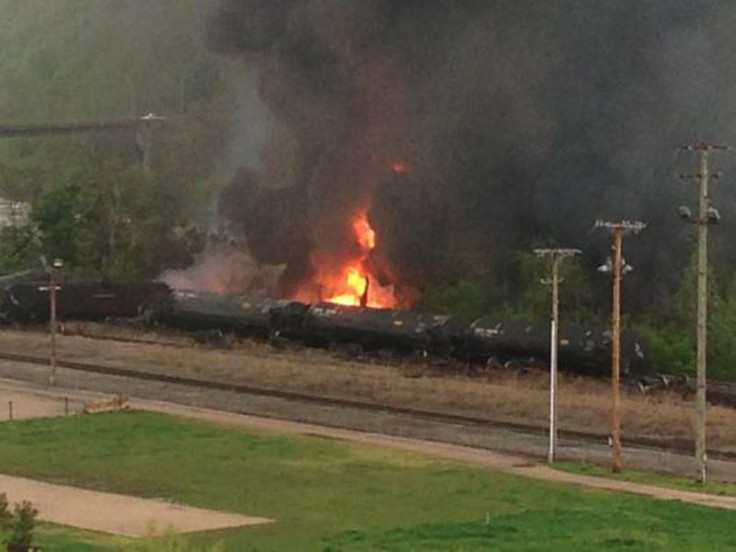Activists Doubt New Rules For Crude Oil Shipments Will Improve Rail Or Environmental Safety

Rail safety and environmental activists say the federal government’s latest emergency order, which requires railroads to share information on crude oil shipments with state authorities, is a good first step. But it doesn’t address the problems that caused several recent fiery train derailments.
The latest accident, in downtown Lynchburg, Virginia, last week, spilled about 20,000 gallons of crude into the James River. In the past year, seven trains carrying crude have derailed and exploded in the U.S., while a wreck in Quebec, Canada, killed 47 people.
“People are dying because of government inaction,” Matt Landon, an activist with Vancouver Action Network in Washington state, said.
The order issued Wednesday requires all railroads operating trains containing more than 1,000,000 gallons of Bakken crude -- about 35 tank cars’ worth -- to tell State Emergency Response Commissions (SERCs) estimates of the amount of crude being transported, the expected route, and the frequency of anticipated train traffic. Oil trains typically pull 100 cars or more.
Until the order, railroads weren’t required to disclose that information. The mandate takes effect within 30 days.
The new order affects the flow of information -- but not of the crude itself. “There’s not any change to oil by rail, the way it’s being shipped, the containers it’s being shipped in, the requirement that the oil companies classify their material, test it and put it in the correct rail cars,” Landon said. “That’s the underlying reason why these cars are blowing up.”
Bakken crude, obtained by hydraulically fracturing shale formations, contains more gas than heavier oils like those from tar sands. That means Bakken crude is more flammable and prone to explode in train collisions.
The federal standard for tank cars shipping oil hasn’t changed since the 1960s, but the Department of Transportation has been discussing setting a new standard before summer.
In a separate request on Wednesday, federal transportation regulators urged shippers to voluntarily stop using older tank cars to haul crude and instead use cars with “the highest level of integrity in their fleet when transporting Bakken crude oil.”
“Today’s actions … will ensure that communities are more informed and that companies are using the strongest possible tank cars,” Anthony Foxx, transportation secretary, said Wednesday.
It’s not yet clear how communication between state committees and communities will work or how it will improve public and environmental safety.
“Why do we have to wait so long to know what’s happened, what’s caused a derailment?” said Bart Mihailovich, director of the riverkeeper program at Spokane, Washington-based non-profit Center for Justice. “We feel there’s far too many questions unanswered to feel comfortable.”
© Copyright IBTimes 2024. All rights reserved.






















